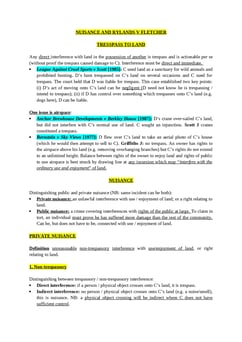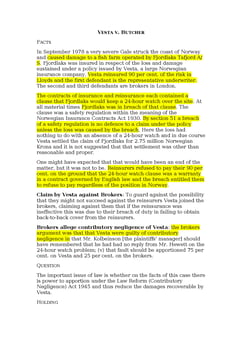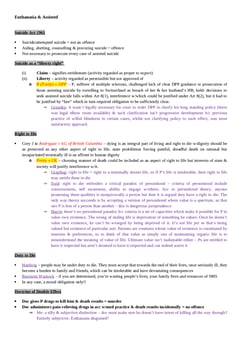Judgement for the case Gregg v Scott
KEY POINTS
-
In determining liability, the court uses a standard called the balance of probabilities.
If something is more likely than not to have occurred, the court treats it as certain.
-
However, when the court is determining damages that depend on what might happen in the future or what would have happened if something in the past hadn't occurred, the rules are different. In these cases, the court has to estimate the likelihood (chances) of a particular event occurring and then factor those chances into the amount of damages it awards.
The court considers how probable or improbable that event is, and it affects the final amount of compensation.
FACTS
Dr. Scott negligently misdiagnosed a lump under Mr. Gregg's arm as harmless when it was cancerous, causing a nine-month delay in treatment. During this time, Mr. Gregg's condition worsened as the cancer spread. His chances of disease-free survival for ten years decreased from 42% to 25%.
The judge determined that prompt treatment could have achieved remission and prevented the cancer from spreading initially. However, the judge also found that a better outcome was never certain, as Mr. Gregg had less than a 50% chance of avoiding his condition's deterioration before the negligence.
The delay reduced this chance by approximately 20%. This reduction represented the extent to which the negligence diminished Mr. Gregg's prospects of avoiding the deterioration in his condition.
JUDGEMENT
Appeal dismissed.
COMMENTARY
Gregg v Scott is a significant decision in the field of medical negligence law.
It illustrates the principles of causation and quantification of damages in medical negligence claims, and emphasizes that a claimant's prospects need not be reduced to zero for damages to be awarded.
Instead, the court assesses the extent to which the negligence diminished the claimant's prospects of a better outcome.
ORIGINAL ANALYSIS
As a result of Defendant’s negligence, Plaintiff’s cancer was diagnosed late and his chances of long term survival were reduced as a result from 42% to 25%.
-
Plaintiff argued:
That the reduction in chances of survival WAS injury, or
That reduced chances of survival should give rise to liability in its own right.
HL rejected “lost opportunity” as giving rise to liability. This case was decided on the traditional guidelines for a tort claim.
Lord Hoffman (majority)
The law treats every harmful event as having a single determinate cause. It is therefore impossible to compensate a person for an act which has not caused the harmful event.
Here on balance of probabilities the impugned treatment did not ‘cause’ the outcome (it merely reduced Plaintiff’s survival chances). To allow compensation in proportion to ‘chance’ would contradict this fundamental position that the law takes on causation.
Exceptions to the rule, such as loss of a chance where the loss is dependent on third party conduct, is an arguably unprincipled exception.
The Fairchild exception (see below) is tightly confined. Another consideration is floodgates, since nearly everything a doctor does affects survival chances by a small percentage.
Lord Nicholls (Minority)
Floodgates is a bad reason for depriving people of compensation.
He also says that since it is a doctor’s duty to protect a patient’s prospects, there ought to be a remedy where this duty is abandoned.
Lord Hope
Says that the enlargement of the tumour itself is physical harm and should be compensated irrespective of effect on survival chances long term.
RELATED CASES
For Further Study on Gregg v Scott

Tort Law notes fully updated for recent exams at Oxford and Cambridge. ...

These are detailed case summaries (excerpts from cases - not paraphrase...
Need instant answers? Our AI exam tutor is here to help.
Ask questions 🙋 Get answers 📔 It's simple 👁️👄👁️
Our AI is educated by the highest scoring students across all subjects and schools. Join hundreds of your peers today.
Get StartedSimilar Cases
Related Product Samples
These product samples contain the same concepts we cover in this case.
| Tort Law | Gregg V Scott Notes (4 pages) |
| Commercial Remedies BCL | Gregg V. Scott Notes (4 pages) |
| Medical Law | Medical Negligence Notes (21 pages) |

 Since 2010, Oxbridge Notes has been a trusted education marketplace, supplying high-quality materials from top achievers at universities like Oxford, Cambridge, LSE, Harvard, and Yale.
Since 2010, Oxbridge Notes has been a trusted education marketplace, supplying high-quality materials from top achievers at universities like Oxford, Cambridge, LSE, Harvard, and Yale.